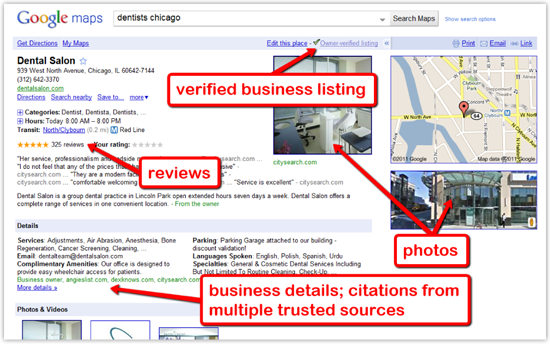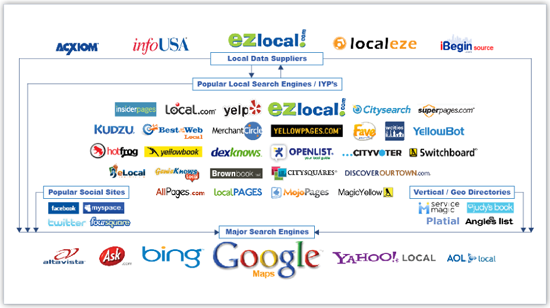Stair-climbing Local Search with Google Citations
Feb 15
There’s a multitude of factors Google uses to organize and display results in Local Search - not to mention the rules of the game are constantly changing. For a thorough explanation of some of the more influential factors, see David Mihm’s collaborative piece: Local Search Ranking Factors. And with all of the recent changes in Google’s Integrated SERP, we’re anticipating the 2011 update to Mihm’s Ranking Factors will be packed with even more useful information. For today’s blog, I’m just going to concentrate on a few things you can do right away to boost your Places listing in search results by establishing a few good citations.
Note: You can add an immediate and monumental boost to your local search rankings with the help of EZlocal search marketing - plans as low as $95 per month.
Of all the ranking factors, citations are one of the most influential.
So if you want your business listing to rank higher in local search, how can you go about getting valuable citations?
Spy on Competitor’s Citations
Yep. This is perhaps the easiest and sure way to find out what trusted sources Google is using for your particular business type and locale. SEOMoz actually did the dirty work for us by putting together an excellent guide on how to find your competitors local search citations or “mentions” on Google titled One Dead Simple Tactic for Better Rankings in Google Local.
Doing the above will help determine what niche and geo-targeted directory sites Google is most frequently using as citations on the Place pages of your competition and which ones you absolutely need to target. Having a list of these sites gives you a starting point to claiming your business listing and building out keyword and media-rich content - the content that will ultimately help you rank for keyword searches on Google, Yahoo! and Bing.

Directory Submission
When your goal is citations rather than inbound links, directory submission is your best bet and in this regards your focus is content corroboration as opposed to links which would normally benefit traditional website SEO -- although including your website link in your business listing remains an important step. And even though there are hundreds of relevant directories out there you can potentially target, we notice a certain level of diminishing search ranking return outside of maybe 25 or so of the top trusted citation sources for any given type of business in any one demographic. But to play it safe, it doesn’t hurt to target as many trusted sites as you can to ensure you saturate this end of your local search optimization strategy. Only be sure you are consistent with all of your listings, particularly with your N.A.P. (Name, Address, and Phone number). Choose one version and stick with it. Remember, the Local Search ecosystem is constantly evolving with new sites popping up all the time so it’s important to stay up-to-date. Many of these sites may also require a certain level of regular maintenance - so make sure usernames and passwords created are properly organized for future use.
Below is a diagram illustrating corroboration flow of Local Search data.

Four and Five Star Ratings
Once you have finished building out robust listings on the most relevant and trusted sites, the next step is to promote these individual pages to your customer base in an effort to solicit as many positive customer reviews and ratings as possible. Here’s a must-read we put together on the topic: Encouraging Customer Reviews: 4 Tips to Get People Talking About Your Small Business.
Video: Watch a short video we threw together on Local Search SEO, covering the manual and passive submission process EZlocal uses for its small business clients.
We’ll even give you a chance at a freebie citation today by claiming your free business listing on EZlocal’s business directory. Newly claimed listings, both free and paid for, are cycled through our homepage and regularly crawled by Google. Just sayin.